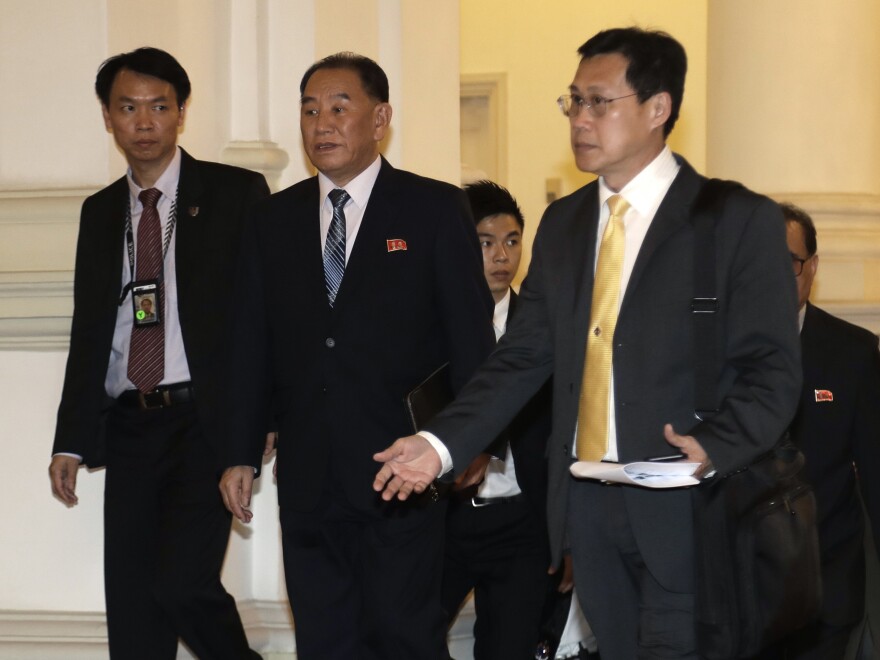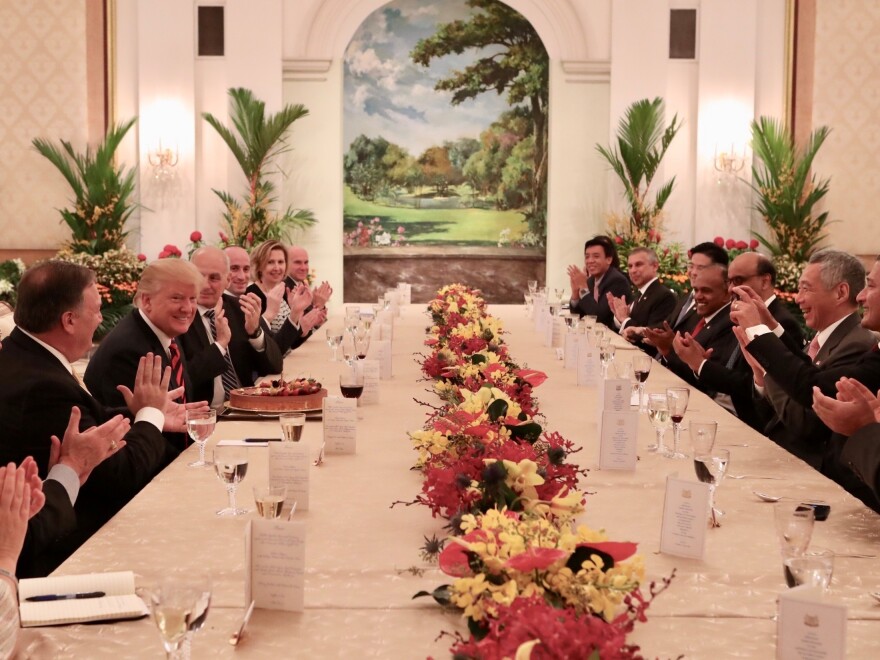When President Trump shakes hands with Kim Jong Un on Tuesday morning, it will mark the first time that a sitting U.S. president comes face to face with a North Korean leader. Trump once dubbed Kim "Little Rocket Man" and threatened "fire and fury" against his regime, but has expressed optimism about a potential deal with North Korea on denuclearization. "I just think it's going to work out very nicely," he said Monday. But he has also said he is prepared to walk away from the table if talks are not fruitful.
Kim Jong Un, North Korea's dynastic dictator and the general of the Korean People's Army, assumed power in 2011 and adopted a dual-track policy of military development alongside economic growth. He has overseen North Korea's period of rapid nuclear advancements, including four of six of his country's nuclear tests.

Until his flurry of diplomacy began this year, Kim — whose grandfather Kim Il Sung founded North Korea in 1948, and father Kim Jong Il led the country until his death in 2011 — had not left North Korea while serving as leader. He studied in Switzerland at an international school in the late 1990s before returning to North Korea around 2000. He is believed to be behind executions of potential challengers including his uncle, Jang Song Taek, and more recently, his half-brother Kim Jong Nam.
When President Trump and Kim Jong Un meet, it will be the result of strenuous diplomacy by officials from the U.S., North Korea and other countries. Here are some of the key figures at the summit.

Secretary of State Mike Pompeo has traveled twice to Pyongyang to pave the way for this summit. A former Kansas Congressman and harsh critic of the Obama administration's nuclear deal with Iran, Pompeo has played a key role in setting the stage for Trump's meeting with Kim Jong Un. He traveled to Pyongyang twice this year, once as CIA director and soon after he was confirmed as secretary of state, both times meeting with Kim. He's trying to convince North Korean officials that they have a "bright future" — but only if they give up their nuclear weapons.
John Kelly, President Trump's second chief of staff, has served in that position for more than 10 months. Previously, Kelly, a retired Marine Corps general, was Trump's secretary of homeland security. Kelly told NPR in May that Trump is going into his talks with the North Korean leader with "his eyes wide open."

John Bolton, President Trump's national security adviser, has a long history of friction with North Korea. Bolton was a sharp critic as President George W. Bush's representative to the United Nations in 2005-2006. He has called for "regime change." Last month, Bolton caused a stir when he suggested North Korea could follow the "Libya model" to dismantle its nuclear program. Libya agreed to abandon its program in 2003, but leader Moamar Gadhafi was killed in 2011. Given this history, and Bolton's hardline positions on North Korea, he's expected to keep a relatively low profile at the Singapore summit.

Joe Hagin, the White House deputy chief of staff for operations, is a White House point person for the summit. He has been leading a team in Singapore that is arranging logistics for the June 12 meeting. Hagin previously served in the George W. Bush administration, also as a deputy chief of staff.
Allison Hooker, a former State Department official who specialized in Korean affairs, joined the National Security Council in 2014, during President Barack Obama's administration. She has remained on the NSC under President Trump and is the council's point person on North Korea. She's a low-key figure, but with experience in high-profile diplomacy. In 2014, she accompanied James Clapper, then the director of national intelligence, to North Korea to win the release of two American detainees. In February, she accompanied President Trump's daughter Ivanka to the closing ceremonies at the Winter Olympics in Pyeongchang, South Korea.

Sung Kim, the U.S. ambassador to the Philippines, was born in South Korea and returned there as U.S. ambassador in 2011. He's one of the rare career Foreign Service officers playing a high profile role in the summit planning — and one of the few with experience, having served as a special envoy in both the George W. Bush and Obama administrations. Kim avoids the limelight and has been quietly negotiating the agenda for the summit with a North Korean delegation in the Demilitarized Zone, trying to iron out what sort of commitments North Korea is ready to make on "denuclearization" and what steps the U.S. might take toward formally ending the Korean War.
Andrew Kim had retired from the CIA last year when then-CIA director Mike Pompeo persuaded him to come back and head the agency's newly established Korea Mission Center. Since then, Kim has been a high-profile presence in U.S.-North Korea contacts. He traveled with Pompeo twice for meetings in North Korea with Kim Jong Un. He has appeared at Pompeo's side in several photos, highly unusual for a typically anonymous CIA official. Kim grew up in South Korea before moving to the U.S.

Lee Hsien Loong, Singapore's prime minister since 2004, is the son of Lee Kuan Yew, the founding father of modern Singapore and the man credited with making it an economic powerhouse. The younger Lee was educated at Britain's University of Cambridge and Harvard University. He served in the army before entering politics. Lee and his father have now led Singapore for 39 of its 53 years of independence. The city-state is extremely prosperous and politically stable, but faces criticism for its strict laws, limited press freedom and extended political control by one family.

Ri Yong Ho, North Korea's foreign minister and longtime negotiator, is often referred to as "soft-spoken" and polite, but made waves last fall when he called President Trump "President Evil" at the U.N. General Assembly last fall, and threatened to test a hydrogen bomb above the Pacific.
Kim Yong Chol is a regime insider, the vice-chair of North Korea's ruling Worker's Party and the country's former spy chief. He's considered Kim Jong Un's "right-hand man." He's served all three generations of the ruling Kim dynasty and has been involved in key negotiations with South Korea. Because of his suspected involvement in the 2010 torpedoing of a South Korean naval vessel and the 2014 hacking against Sony, Kim is sanctioned by the United States. He received a waiver to visit the White House to meet with President Trump in the run-up to the Singapore summit.


Choe Son Hui is North Korea's vice minister of foreign affairs and the point person on North Korea's relations with the United States. An experienced diplomat and former English-language interpreter, she was involved in the Six Party Talks and other high-level North Korean diplomacy with the U.S., including the 2009 trip to Pyongyang by former President Bill Clinton. Last month, she called Vice President Mike Pence's warning about a Libya-style ending to the regime the "ignorant and stupid" remarks of a "political dummy" — after which Trump said he was canceling the summit.
Copyright 2021 NPR. To see more, visit https://www.npr.org.








